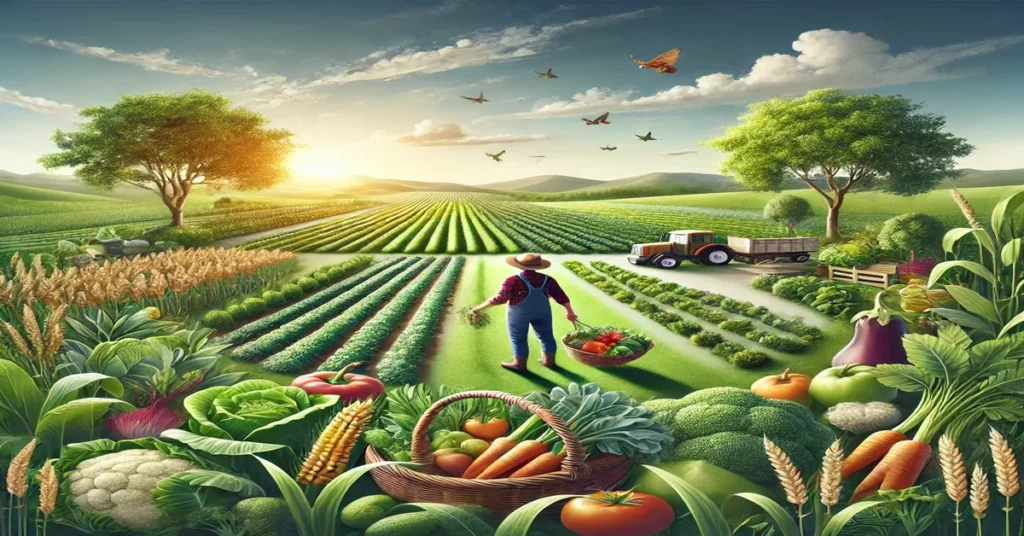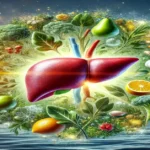In recent years, ỏganic food and organic farming have garnered widespread attention, as more people are looking for healthier, more sustainable food options. The growing interest in organic agriculture reflects a shift towards environmentally conscious consumerism and a desire to consume food that is grown without synthetic chemicals and pesticides. In this article, we will explore the concept of organic food and farming, its benefits, challenges, and the impact it has on human health and the environment.
What is Organic Food?
ỏganic food is produced without the use of synthetic fertilizers, pesticides, herbicides, or genetically modified organisms (GMOs). ỏganic farming relies on natural processes, such as crop rotation, composting, and biological pest control, to maintain soil fertility and manage pests. As a result, organic foods tend to be healthier, more sustainable, and environmentally friendly than their conventional counterparts.
The principles of organic farming are based on promoting biodiversity, soil health, and ecological balance. Organic food production emphasizes the importance of maintaining the integrity of natural ecosystems while ensuring that the food produced is safe and nutritious.
The Rise of Organic Food
The organic food movement can be traced back to the early 20th century when scientists and farmers began to question the negative effects of industrial farming practices on the environment and human health. The widespread use of chemical pesticides and synthetic fertilizers in the 1950s led to concerns about the long-term impact on soil health and the safety of food.
As more consumers became aware of these concerns, organic farming methods began to gain popularity. In the 1970s and 1980s, organic certification programs were established in various countries to ensure the quality and authenticity of organic products. Today, organic food is a multi-billion-dollar industry that continues to grow, with more people choosing to buy organic produce, dairy, meat, and packaged goods.
What is Organic Farming?
ỏganic farming is an agricultural system that relies on natural methods to grow crops and raise livestock. It is a holistic approach to farming that seeks to promote soil fertility, protect water quality, and reduce the environmental impact of farming practices. Organic farming involves using sustainable farming techniques that work in harmony with nature, rather than relying on synthetic chemicals or genetic engineering.
The key principles of organic farming include:
- Soil Health: ỏganic farmers focus on maintaining and improving soil fertility through crop rotation, cover crops, composting, and the use of organic fertilizers. Healthy soil is essential for growing nutritious crops and maintaining long-term agricultural productivity.
- Biodiversity: ỏganic farming encourages the use of diverse crop species and natural pest control methods. By maintaining a balance of beneficial insects, plants, and animals, organic farms can reduce the need for chemical pesticides and herbicides.
- Environmental Sustainability: Organic farming practices aim to minimize environmental harm by reducing soil erosion, conserving water, and promoting sustainable land management. Organic farms also strive to reduce their carbon footprint by using renewable energy sources and reducing waste.
- Animal Welfare: ỏganic livestock farming emphasizes the humane treatment of animals, providing them with access to pasture, ỏganic feed, and freedom from the use of antibiotics or growth hormones.
Benefits of Organic Food
There are several compelling reasons why people choose to buy organic food. These benefits extend to human health, the environment, and the economy. Let’s explore some of the main advantages of consuming organic products.
1. Healthier Food
One of the primary reasons people choose organic food is its potential health benefits. Organic foods typically contain fewer pesticides and synthetic chemicals, which may pose health risks when consumed over time. By avoiding the use of chemical pesticides and fertilizers, organic farming produces food that is free from harmful residues.
Organic produce may also contain higher levels of certain nutrients, such as antioxidants, vitamins, and minerals, due to the healthier soil and farming practices that promote plant vitality. Studies have suggested that organic fruits and vegetables tend to have higher concentrations of phenolic compounds, which have antioxidant properties and are linked to a reduced risk of chronic diseases.
2. Environmentally Friendly
Organic farming practices are more sustainable and environmentally friendly than conventional farming methods. By avoiding synthetic chemicals, organic farms help to preserve biodiversity, improve soil quality, and protect water sources from contamination. ỏganic farms tend to have lower greenhouse gas emissions and a smaller environmental footprint due to their reliance on natural processes and renewable resources.
Additionally, organic farms are less likely to contribute to soil erosion and water pollution, as they prioritize soil health and avoid practices like monocropping, which can deplete soil nutrients and lead to water runoff.
3. Improved Animal Welfare
Organic farming places a strong emphasis on the ethical treatment of animals. Organic livestock are raised in more natural environments, with access to pasture, and are fed organic, non-GMO feed. Furthermore, organic standards prohibit the use of growth hormones and antibiotics, which are often used in conventional farming to promote rapid growth and prevent disease.
Organic farming methods ensure that animals are treated humanely, allowing them to express natural behaviors and live healthier lives. This focus on animal welfare has led many consumers to choose organic animal products, such as meat, eggs, and dairy, over their conventionally produced counterparts.
4. Taste and Quality
Many people claim that organic food tastes better than conventionally grown food. This is because organic farming practices focus on maintaining soil health and producing crops that are naturally resistant to pests and diseases. As a result, organic food may have richer flavors, better texture, and higher quality than conventionally grown produce.
Although taste is subjective, studies have shown that organic food may have higher levels of certain beneficial compounds, such as vitamins and antioxidants, which can enhance the flavor and nutritional content of the food.
5. Support for Local and Small Farmers
Buying organic food often means supporting local farmers and small-scale agricultural operations. Many organic farms are family-owned and run, and purchasing organic products can help support the livelihoods of farmers who prioritize sustainability and environmental stewardship. By supporting organic farmers, consumers are also investing in a more equitable food system that promotes fair labor practices and reduced reliance on large agribusinesses.
Challenges of Organic Farming
While organic farming offers numerous benefits, it also presents several challenges that can make it difficult for farmers to adopt or scale up organic practices. Some of these challenges include:
1. Higher Production Costs
Organic farming typically requires more labor-intensive practices, such as manual weeding, crop rotation, and composting. These practices can increase production costs for organic farmers, which may result in higher prices for organic food. Additionally, organic certification programs can be expensive, and farmers must adhere to strict standards and regulations to maintain their certification.
2. Lower Yields
Organic farms generally produce lower yields than conventional farms, due to the absence of synthetic fertilizers and pesticides. This can make organic farming less efficient, especially in regions with poor soil quality or challenging growing conditions. However, proponents of organic farming argue that the long-term benefits of improved soil health and environmental sustainability outweigh the short-term yield losses.
3. Pest Management
Without the use of chemical pesticides, organic farmers must rely on natural pest control methods, such as introducing beneficial insects, rotating crops, or using organic-approved pest control products. While these methods can be effective, they may not always provide the same level of protection as synthetic pesticides, leading to potential crop damage and yield losses.
4. Limited Availability and Accessibility
While organic food is becoming more widely available, it is still not as accessible as conventionally grown food in some areas. Organic products may be more expensive, and not all supermarkets or grocery stores carry a wide range of organic options. Additionally, some regions may have limited access to organic farms or farmers’ markets, making it difficult for consumers to purchase organic food.
Conclusion
Organic food and organic farming represent a growing movement that prioritizes sustainability, health, and environmental stewardship. Organic farming methods promote biodiversity, soil health, and animal welfare while minimizing the use of synthetic chemicals and GMOs. The benefits of organic food, including improved nutrition, better taste, and reduced environmental impact, make it an attractive option for many consumers.
However, organic farming also faces several challenges, including higher production costs, lower yields, and limited accessibility. Despite these obstacles, the organic food industry continues to grow, driven by consumer demand for healthier, more sustainable food options.
As awareness of the importance of organic farming grows, it is likely that organic food will become more widely available and affordable in the coming years. By supporting organic farming practices, consumers can contribute to a more sustainable and equitable food system while enjoying the many benefits that organic food has to offer.
Frequently Asked Questions (FAQs)
1. What is the difference between organic and conventional food?
Organic food is grown without synthetic fertilizers, pesticides, or GMOs, while conventional food may be treated with chemicals, pesticides, and growth hormones. Organic farming also focuses on sustainability, biodiversity, and soil health, whereas conventional farming may rely more heavily on industrial methods.
2. Is organic food always healthier?
While organic food may contain fewer pesticide residues and chemicals, studies suggest that it may also have higher levels of certain nutrients and antioxidants. However, the overall health benefits can vary depending on the specific product and its growing conditions.
3. Why is organic food more expensive?
Organic food tends to be more expensive due to higher production costs, including labor-intensive practices, organic certification fees, and lower yields. Organic farming also avoids the use of synthetic chemicals, which can reduce costs but also increase reliance on more natural and costly methods.
4. Can organic farming feed the world?
While organic farming produces lower yields than conventional farming, it can still be part of a sustainable food system. By improving soil health and using more efficient farming practices, organic farming can contribute to global food production while minimizing environmental damage.
5. Does organic farming use pesticides?
Organic farming may use natural or non-synthetic pesticides to manage pests, but these are typically less harmful than synthetic chemicals used in conventional farming. Organic standards allow certain approved substances, but the emphasis is on prevention and natural pest control methods.
6. Are organic products non-GMO?
Yes, organic products are required by law to be free from genetically modified organisms (GMOs). Organic farmers must use non-GMO seeds and follow strict guidelines to prevent contamination from GMO crops.







